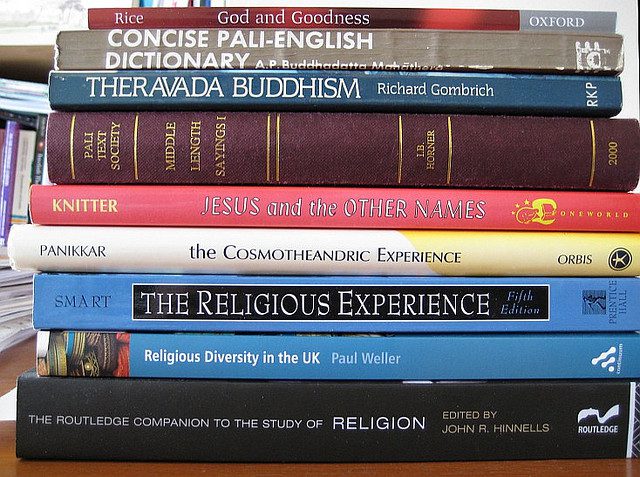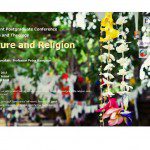
As winter break wraps up and spring semester starts at colleges and universities across the country, more than a few students out there will be reconsidering their choice of majors, or at least dabbling in fun and interesting classes outside their department. While a number of classes may come highly recommended, two courses that really must be taken by any student today are an Introduction to World Religions and an introductory Philosophy course, which come under many names:
- “World Philosophies” tends to be rare, but should include thinkers from outside the typically Euro-American-centric world of Western academic Philosophy,
- “Ethics: Great Traditions” will give you Aristotle, Kant, and Mill with a few others sprinkled in,
- “Ancient Philosophy” will introduce you to mostly Greek and Roman thought that shaped European culture including its religious thought,
- “Modern Philosophy,” which usually follows from Ancient, introducing you to thinkers ranging generally from Descartes to Kant or so, again giving you access to the thoughts and ideas that shaped the world we live in today, and
- “Logic,” which is one I’d reserve for people who like systems, puzzles, and perhaps mathematics or those ready to dive fully into philosophy.
My own flirtations with philosophy and religious studies started as an undergraduate about 15 years ago. I was studying Business with a focus on Accounting and slowly came to realize that my highest career aspirations involved things like having my own office, and then one with a window, and, if I really did well, two windows. Suddenly accounting, which I had been great at in High School and my first year at University, lost all appeal. My whole life’s journey suddenly lost meaning and I had what some people would call an “existential crisis” and others would just trump up to late teen hormonal or brain-chemical imbalance. I suffered my way through the last months of spring semester and promptly dropped out of college, returned home and got a 9-5 job at a local radio station. The one thing that 9-5 job taught me was that I never wanted another 9-5 job again. In hindsight it wasn’t all that bad: I only really worked about 2-3 hours a day, with the rest of my time free to teach myself html (this was the late 90s) and to read books, the most memorable being Crime and Punishment. This sparked a fire in me of wonder about the world and the workings of the human mind. Returning to college the next fall, I promptly enrolled in as many non-business related classes as I could. Two of those were an Intro to Buddhism class and an Ethics: Great Traditions class. And as they say, the rest is history. (Or, in reality, they say that the rest is a meandering journey of changing majors, fumbling through two MA programs, landing in a nearly perfect PhD position and wandering to and fro from there as well, but that’s a longer story). On to the articles: 1. First, from the Studying Religion in Culture at the University of Alabama blog, comes a spirited argument – from a sophomore – about why every student should take a religious studies class. Not long after changing her major to Religious Studies, Emily Vork says:
It quickly became clear to me that the field of Religious Studies is not really all that well-known or well-understood. Religious Studies is not Theology, nor is it a field full of classes like “Why God Doesn’t Exist” or “Everyone Should Be Buddhist”.
Learning to live in a state of suspended ambiguity is key to the study of religion (and philosophy, and well, a lot of things). The students who will do well are those who can thrive in that larger realm of ambiguity: finding solid markers like texts, inscriptions, historical facts and arguments, etc, but still accepting that what any of these really mean might be open to certain degrees of interpretation and nuance. Those who suffer the most are the students who cling most firmly to past understandings of what x is or how x is to be taught. Volk nails it when she writes:
After taking just a handful of classes in the department, each of which covering a variety of different topics, I’ve found that my capacity for critical thinking has increased tremendously. Things are no longer quite so cut-and-dry. News headlines that I would have previously accepted without a second thought I now find myself wondering: who wrote that? How did they write it, and why did they write the way they did? On top of that, I notice now that I’m more willing to take a step back from anything and give it a critical glance. Why are social norms the norm? To quote one of our department’s business cards: “Why do we cheer for the home team?”
2. The second article is a defense of philosophy in light of today’s dismal state of politics and culture in American society. In a recent article at Huffington Post, Michael Shemmer, a “law student and cynical idealist,” writes of the current situation that, “Anger is everywhere; understanding is nowhere.” That anger is based in generally polarized views held with “iron certainty.”
Shemmer continues (with optimism not unlike my own – see my last post), that:
With a philosophic worldview, a Republican who despises any tax increase or economic stimulus could at least consider the notion of tax hikes or Keynesian economics. A Democrat facing antithetical ideas could do likewise. Thought rather than anger could become the default response to opposing worldviews.
Indeed, philosophy can do a great deal to lessen the anger that is growing like a cancerous tumor in modern America. The tools exist in both Eastern and Western thought — in the Stoic exhortation to accept the present as it is, in Buddhist meditation, in the Humanist’s transcendent appeal to reason, in Kant’s categorical imperative. Philosophy can help us inculcate virtue for, in the words of Socrates, “knowledge is virtue.”
Any philosophy major will know the cliche that we learn not what to think, but how to think. This is important to recognize because so many people and indeed so many stressed out students just want to know what to think, what to regurgitate, they want information to absorb (in the best case), or to be entertained (in the worst). All of the talk of shrinking attention spans and addictions to the instant gratification of technology seems true across our society these days, and all of this is antithetical to philosophical thinking.
In the age of instant access to the web: email, chat, facebook, insta-everything; there’s no time for simply pondering the big questions. Hence the demand for quick and easy answers. As Shemmer continues:
I think this is a great mistake. We should consider these questions. For by reading philosophy, I became less frightened of them. I no longer shirked away from contemplating death (thanks Epicurus) or morality (thanks Kant) or misfortune (thanks Epictetus). More, I realized that anger — in both politics and everyday life — is largely a reaction to fear, and that this fear can be lessened exponentially through the sort of reflection philosophy fosters.
People today, especially young people, have plenty of reasons to be afraid. But it is only in our incapacity to think through those fears that anger arises out of them. There are fine distinctions to be made, as well, between the kind of outrage one feels at seeing injustice and the resulting move to correct action and the kind of wild, destructive, polarizing anger Buddhists (and philosophers) tend to worry about.
But suffice to say that thinking deeply about world issues from a wide variety of standpoints, seeking to broaden one’s own in turn, leads to a calmer, clearer, more focused, and effective direction in life.












